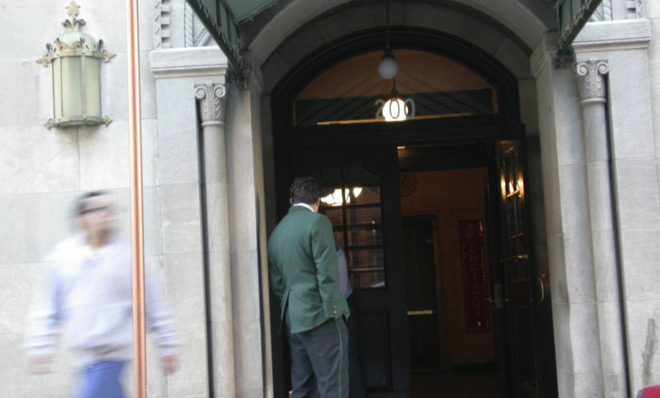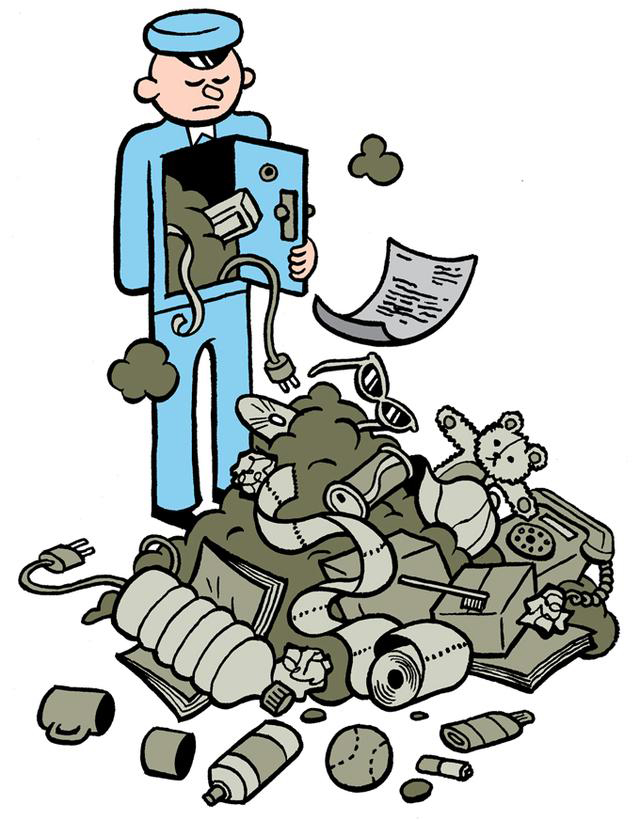The secret life of a Manhattan doorman
A college student is stoked to land a summer gig as a union-wage doorman — until he learns the job description includes everything from hauling out hoarders to discovering dead bodies

A free daily email with the biggest news stories of the day – and the best features from TheWeek.com
You are now subscribed
Your newsletter sign-up was successful

The smells are the thing I don't forget. Harsh cleaners, dead bodies, the results of 4 a.m. bodega runs, cluttered apartments filled with rotting paper. I can recall each smell distinctively; they are unique to that time and place. It also works in reverse: If I stumble upon one of the smells, it takes me back to being a naive 17-year-old, working in the hot New York City summer — the buzz of air conditioners working in the night, straining power grids. The city was asleep and I was awake. I was a doorman.
Through the best Catholic invention of all time — nepotism — my uncle gave me a summertime job. While most of the youth of America struggled to find any money-making position, I was going to make $660 for my 40 hours a week, after taxes. Union rules — god bless union rules — added time-and-a-half for overtime and double time-and-a-half for holidays. I covered vacations — most of the doormen and porters in the building had at least three weeks paid — so I would work whenever I was needed and, as a result, worked the crappy shifts. The swing shifts — literally working any time of day or night — and the midnight-to-eight a.m. shift became my summer.
That first summer, I dedicated myself to finding some kind of spiritual awakening. I decided to read the entire Kurt Vonnegut canon. It was not in order, but during lunch breaks and slow times at the door I would peel back the pages and plunge in.
The Week
Escape your echo chamber. Get the facts behind the news, plus analysis from multiple perspectives.

Sign up for The Week's Free Newsletters
From our morning news briefing to a weekly Good News Newsletter, get the best of The Week delivered directly to your inbox.
From our morning news briefing to a weekly Good News Newsletter, get the best of The Week delivered directly to your inbox.
(More from Narratively: The secret life of a ghost hunter)
The summer went by quickly. June and July were consumed by Nazi propagandists (Mother Night), Watergate (Jailbird), and Kilgore Trout. It was those unrelenting August nights that played and preyed on my mind my first year. The lobby A/C barely worked and I constantly sweat through my baby blue polyester building-issued shirt. I would spend the midnight-to-eight-a.m. shift reading at the desk. At around four I would lock the front door and walk to the bodega on Broadway with a box cutter in my pocket ("Always carry this," my uncle told me the first night). There I would buy cups of iced coffee, Red Bull, and gum.
I hated walking back. The lack of social interactions on the overnight shift killed me. I would be lucky if I had the chance to talk with anybody coherent. Midnight to three consisted of the drunks — rich residents and rich friends stumbling around, fumbling for keys, phones, wallets. Three to five was dead — nobody in or out. While I waited for sunrise, five to eight was work — peeling my back from the stool, locking the door, taking the newspapers that magically appeared on the stoop (I never saw the delivery van), and putting out garbage bins on all of the floors. Residents ran out yelling on phones, at children, at occupied taxis speeding by as I handed out keys to housekeepers, learning to communicate in broken English. I greeted the porters and day doorman, who never came up to the desk at eight, always at 8:05 a.m. or later, wearing a snide smile.
At the end of the shift, I would run to the subway and take it to Grand Central Terminal to reverse commute. I was going home from work to the suburbs while most people were traveling to their jobs in the city. Sleeping against the sun on the train, then in my bed, I would wake up in the afternoon.
A free daily email with the biggest news stories of the day – and the best features from TheWeek.com
"What am I doing?" I asked myself.
"You are making money," I answered.
What day is it? What month is it?
I lost all sense of time and all ability to interact. The weeks on the overnight shift were like solitary confinement. My day planner from that period makes no sense; pages either blank or full of scribbling of strange ideas. It was my own personal Groundhog Day every night, the same, unmovable time loop over and over and over. Vonnegut, of all people, tried to keep me sane.

New York City residents know an incredible amount about their neighbors, without even doing too much detective work. Smells and open doors can give you insightful knowledge into neighboring rooms, but the remaining mystery of what residents don't know about their neighbors is exploited. It is exploited by those working in buildings.
Nobody ever went inside 6H. In a building with 120 apartments you recognize faces, names on packages, and number-letter combinations. 6H never came up.
"We're going upstairs," my uncle said one day. He fished a key from his shirt pocket and tossed it to me. "To 6H."
"What are we doin'?"
"You'll see."
(More from Narratively: The wonderbrewer of nowheresville)
After the short elevator ride, I tried the key in the door of 6H. My uncle laughed at the struggle; he knew exactly what he was doing.
"What are you doing?" he mockingly yelled and motioned me away. He opened the door in one swift motion, but it only moved in three inches. It was pitch black, bizarre for an early afternoon summer day. I fished out my mini Maglite and pushed hard on the door. Something crashed and all I saw was paper. Rotting sheets revealed the half-life of newsprint. I couldn't see walls or windows. We stepped over old newspapers and issues of magazines. I remember a New Yorker issue covered with an army of snowmen. It was dated January 8, 1972.
"This lady died two years ago," my uncle informs me. "Not in here, thank god. We would have never found her."
It sat empty of humans but full of stories, clips, bills, letters. I made a joke about turning up the heat to 451 degrees Fahrenheit. My uncle stared at me. I mumbled something back to cover my embarrassment.
The son of the dead woman was finally able to sell the one-bedroom apartment, after two years of court probate due to the lack of a will. We found the will when we were emptying out the apartment. The garbage filled three 40-cubic-yard dumpsters. The will left all of the woman's fortune and apartment to various public institutions, with no mention of the son. He was cut out. The next day we revealed this to him. We gave him the document, for which he tipped us an extra $200 each. Nothing was said. The apartment was repainted and sold for over a million dollars, which a court allowed the son to keep. The will ended up like all of those other words — in a landfill, forgotten, never to be read again.
Read the rest of this story at Narratively.
Narratively is an online magazine devoted to original, in-depth and untold stories. Each week, Narratively explores a different theme and publishes just one story a day. It was one of TIME's 50 Best Websites of 2013.
More from Narratively: Nick Brown smelled bull
-
 How the FCC’s ‘equal time’ rule works
How the FCC’s ‘equal time’ rule worksIn the Spotlight The law is at the heart of the Colbert-CBS conflict
-
 What is the endgame in the DHS shutdown?
What is the endgame in the DHS shutdown?Today’s Big Question Democrats want to rein in ICE’s immigration crackdown
-
 ‘Poor time management isn’t just an inconvenience’
‘Poor time management isn’t just an inconvenience’Instant Opinion Opinion, comment and editorials of the day